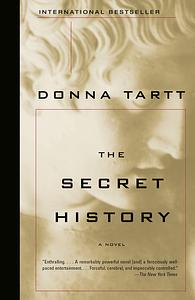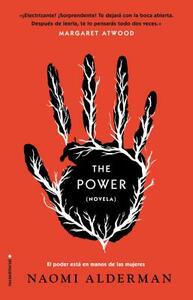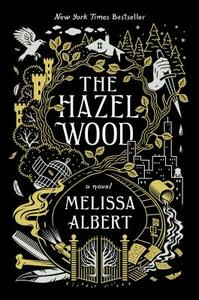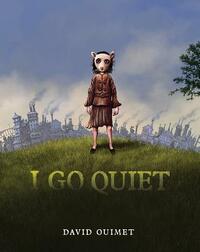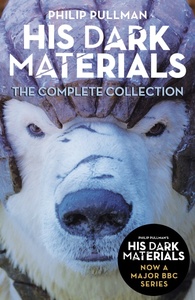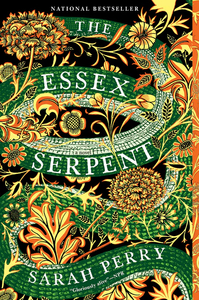You need to sign in or sign up before continuing.
Take a photo of a barcode or cover
yolanda_h's Reviews (307)
I was very intrigued by the concept and could not wait to embark on this journey. After reading this book, I am still very intrigued by the concept, the intelligence of it and the dystopian world the author has created. But while I was reading it, I kept feeling there was something missing, that it scratches the surface but that it could have been taken further. It is an exciting read and never boring, but maybe there are too many characters who share their view and experience of all the dangers of this new and changed world. I wanted to dive deeper into this fascinating concept, but found myself annoyed by some characters instead.
It was a good read, it just didn’t exceed my expectations.
It was a good read, it just didn’t exceed my expectations.
Neil Gaiman weaves a tale of both light and dark threads. He retells a known fairytale in a way that you think you know what to expect, but he manages to surprise you in the end. A little treasure with captivating illustrations.
Even though it took me quite a while, I finished these thousand pages and ‘three books in one novel’ in one go. I didn’t revert to other books between the three stories in this ark, and that says a lot. I’ve enjoyed the rich world(s), story arcs and narrative perspectives throughout His Dark Materials. From the first pages I was swept away and I couldn’t let go of Lyra and Pantalaimon.
The introduction slightly warned me as a reader that part two could me perceived as a bit slower paced or harder to read. In contrast to part one, The Golden Compass, book two (The Subtle Knife) doesn’t set off in a world full of witches, armored bears and animal companions, but in our world or at least a world like our own. I didn’t experience any struggle reading book two. Perhaps because there is still an ample amount of fantasy elements with the narrative perspective switching between characters and world. I do suggest not to wait years before reading The Subtle Knife, as you’ll have forgotten details which the story expects you to remember. Once those details have been lost to you, the switching between worlds and narrators and the bulk of information can be confusing.
His Dark Materials deserves four stars alone for making me read it in one go. If I could, I’d give 4,5 stars. I thought one of the ‘plot solutions’, or the way in which several major plot lines are resolved/tied together, was quite underwhelming. It felt forced and not fitting with the prior development of the involved characters. The whole arc is so rich and well built, that this part felt like ‘Okay, this is what has to happen, one way or the other’ and that left me with a slight unsatisfied feeling. The ending made up for it though.
It will take a while before I’m able to let Lyra, Pantalaimon and Will go. And that is, for me, what great stories do.
The introduction slightly warned me as a reader that part two could me perceived as a bit slower paced or harder to read. In contrast to part one, The Golden Compass, book two (The Subtle Knife) doesn’t set off in a world full of witches, armored bears and animal companions, but in our world or at least a world like our own. I didn’t experience any struggle reading book two. Perhaps because there is still an ample amount of fantasy elements with the narrative perspective switching between characters and world. I do suggest not to wait years before reading The Subtle Knife, as you’ll have forgotten details which the story expects you to remember. Once those details have been lost to you, the switching between worlds and narrators and the bulk of information can be confusing.
His Dark Materials deserves four stars alone for making me read it in one go. If I could, I’d give 4,5 stars. I thought one of the ‘plot solutions’, or the way in which several major plot lines are resolved/tied together, was quite underwhelming. It felt forced and not fitting with the prior development of the involved characters. The whole arc is so rich and well built, that this part felt like ‘Okay, this is what has to happen, one way or the other’ and that left me with a slight unsatisfied feeling. The ending made up for it though.
It will take a while before I’m able to let Lyra, Pantalaimon and Will go. And that is, for me, what great stories do.
I picked up this book by chance. Because the cover seemed to speak to me, calling me to flip through the pages and walk into this story. The Essex serpent was luring me in, just like it whispers and calls to the people of Aldwinter in the story. Another reason was that during an event in 2020 I was to play a role of a Victiorian woman believing in science and wanting to be a doctor in 1872, while the world around her seeks refuge in god, superstition and the supernatural. And if you know me, you also know that I have a soft spot for books mixing in folklore and history.
This story is situated in 1893 and Cora Seaborne has just become a widow. The mold her husband had violently forced her into ('I'll fill your wounds with gold') cracks open and she is free, or is she really? She does shake off the expectations of her stature and society, lets her hair loose and puts on a new coat, literary and figuratively. She retreats to the countryside and hears about the rumours of the 'Essex Serpent', a creature of myth and folklore. It is believed to have returned to the Essex shore and is now roaming the marshes.
Cora, a woman of science, believes it to be an undiscovered species. She sets out to find this serpent, whatever it may be, and her search leads her to the tiny rural village called Aldwinter. Meanwhile its vicar William Ransome tries to take away the villagers' hysteria and superstition about the Serpent with faith and god. Cora and William collide like science and faith can collide, but also find their lives entwining more and more.
The story for me is not about the mythical Essex Serpent, but what occurs when things start happening that you can't explain. Death, nature, disease, a changing world and society: what do you cling to? Science, faith, superstition or just yourself? How do we as humans try to make sense of things we cannot see, or do not know? The book made me think of the year 2020 and what is happening in the world right now. A virus is something we cannot grasp. How we react to it and which belief system we fall back on differs greatly and makes us collide with each other.
But this is also a story about being agreeing to disagree and love despite these differences. And about being flawed and deserving the best.
I fell in love with Cora Seaborne the instant she came into the picture. The same happened to me as to other characters in 'The Essex Serpent': I couldn't resist the engaging and witty woman of high stature wearing a bulky men's coat. Covered in mud to the knees after long walks or roaming the shores for fossils, amonites or an undiscoverd species. Her free spirit, beliefs and behaviour are seen as 'unwomanly' in her social circles at the time. And that is how she prefers it. Being seen as a woman seems to feel unsafe for her. 'I'm only a mind, not a body' is what she tells herself and others. This might have to do with how her late husband treated her.
What makes her even more interesting as a character, is that she is flawed. She makes the people around her love her, but will never let anyone close. When they do, she pushes them away or hurts them. What she says and how she acts can even be pure cruelty. Like Martha, who loves Cora deeply, comments when Cora is letting herself drown in self-pity and isolation after she has pushed several people away:
Did you really think you could carry on like that - you never wanted friends or lovers - you wanted courtiers! What you have on your hands is a peasants' revolt.'
And still, I cannot help but love Cora Seaborne.
And I cannot help but love this novel. It is with me when I wear clothes in different shades of blue and I think to myself that Stella Ransome would have approved of it. I think of Cora's son Francis when I look at my own box of treasures - found at sea, in the woods. Finishing this novel feels like Cora describing her connection to Essex, Aldwinter and to William Ransome:
'Then it carried me in spate to the Essex shore, to all the marsh and shingle, and I tasted on my lips the salt air which is also like the flesh of oysters, and I felt my heart cleaving, as I felt it there in the dark wood on the green stair and as I feel it now: something severed, and something joined.'
This story is situated in 1893 and Cora Seaborne has just become a widow. The mold her husband had violently forced her into ('I'll fill your wounds with gold') cracks open and she is free, or is she really? She does shake off the expectations of her stature and society, lets her hair loose and puts on a new coat, literary and figuratively. She retreats to the countryside and hears about the rumours of the 'Essex Serpent', a creature of myth and folklore. It is believed to have returned to the Essex shore and is now roaming the marshes.
Cora, a woman of science, believes it to be an undiscovered species. She sets out to find this serpent, whatever it may be, and her search leads her to the tiny rural village called Aldwinter. Meanwhile its vicar William Ransome tries to take away the villagers' hysteria and superstition about the Serpent with faith and god. Cora and William collide like science and faith can collide, but also find their lives entwining more and more.
The story for me is not about the mythical Essex Serpent, but what occurs when things start happening that you can't explain. Death, nature, disease, a changing world and society: what do you cling to? Science, faith, superstition or just yourself? How do we as humans try to make sense of things we cannot see, or do not know? The book made me think of the year 2020 and what is happening in the world right now. A virus is something we cannot grasp. How we react to it and which belief system we fall back on differs greatly and makes us collide with each other.
But this is also a story about being agreeing to disagree and love despite these differences. And about being flawed and deserving the best.
I fell in love with Cora Seaborne the instant she came into the picture. The same happened to me as to other characters in 'The Essex Serpent': I couldn't resist the engaging and witty woman of high stature wearing a bulky men's coat. Covered in mud to the knees after long walks or roaming the shores for fossils, amonites or an undiscoverd species. Her free spirit, beliefs and behaviour are seen as 'unwomanly' in her social circles at the time. And that is how she prefers it. Being seen as a woman seems to feel unsafe for her. 'I'm only a mind, not a body' is what she tells herself and others. This might have to do with how her late husband treated her.
What makes her even more interesting as a character, is that she is flawed. She makes the people around her love her, but will never let anyone close. When they do, she pushes them away or hurts them. What she says and how she acts can even be pure cruelty. Like Martha, who loves Cora deeply, comments when Cora is letting herself drown in self-pity and isolation after she has pushed several people away:
Did you really think you could carry on like that - you never wanted friends or lovers - you wanted courtiers! What you have on your hands is a peasants' revolt.'
And still, I cannot help but love Cora Seaborne.
And I cannot help but love this novel. It is with me when I wear clothes in different shades of blue and I think to myself that Stella Ransome would have approved of it. I think of Cora's son Francis when I look at my own box of treasures - found at sea, in the woods. Finishing this novel feels like Cora describing her connection to Essex, Aldwinter and to William Ransome:
'Then it carried me in spate to the Essex shore, to all the marsh and shingle, and I tasted on my lips the salt air which is also like the flesh of oysters, and I felt my heart cleaving, as I felt it there in the dark wood on the green stair and as I feel it now: something severed, and something joined.'


